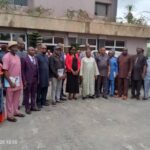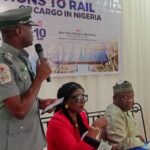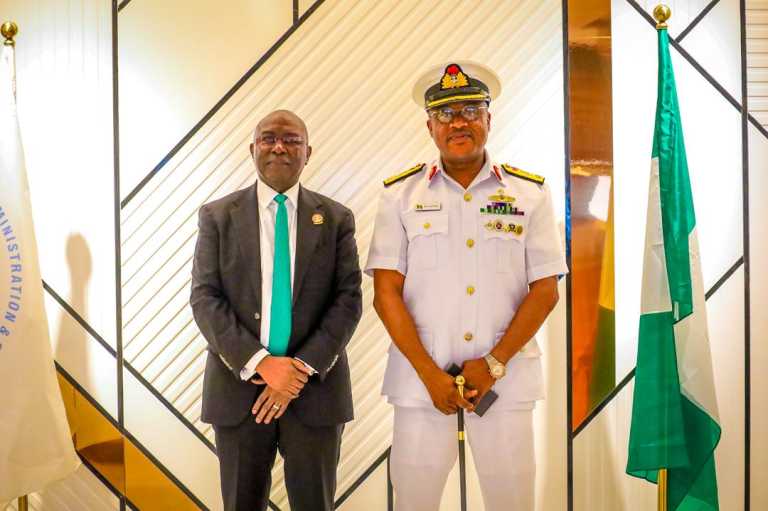Nigeria Shippers’ Council Hosts Summit to Address Railway Transportation Challenges
By Our Correspondent
In a bid to revitalize Nigeria’s railway system, the Nigeria Shippers’ Council, in conjunction with the Nigerian Railway Corporation, recently convened a one-day summit to tackle the limitations hindering efficient railway transportation of cargo in the country.
Presenting her address at the summit, which was held on the 25th March, 2025 at Bougainvilla Hotel, PortHarcourt, Rivers State; Mrs. Agatha Ify Okolue, Director, South-South Zonal Coordinating Office of Nigerian Shippers’ Council, said that the essence of the day’s gathering wasn’t to discuss personal issues, but on something that will impact on the progress of the country.



The Zonal Director, who described Railway system as the backbone of industrialised nations, acknowledged that despite efforts being made in the Nigerian rail system, that issues of rail emission, lack of fund, unavailability of rail coaches and lack of patronage to the transport sector, among others, are still militating against the progress of the sector.
Mrs. Okolue, while commending the Federal Government and the Nigerian Railway Corporation for their efforts in ensuring an enhanced Railway system in the country, opined that the 6.2 Km PortHarcourt – Aba rail road will bring connectivity and seamless business activities in the transport sector, pointing out that the choice of PortHarcourt for the summit was as a result of its significant role as a port city and business hub.
She further affirmed that the rail system only covered about 3.2 percent of the freight business in the country, but optimistic that when enhanced, will take care of the large number of trucks and tankers that are littering across the ports, high cost of demurrage and provide for ease of doing business at the ports and to hinterland.
In the same vein, the Executive Secretary/CEO, Nigerian Shippers’ Council, Barr. Pius Akutah, represented by Mr. Mustapha Zubairu, Director, Inland Transport Services in his address, described global transportation as a critical component in the conduct of domestic and international trade with great impact on national economic growth and development.
He was of the view that the safety, quality, cost and efficiency of transport services influences the trading environment and and competitiveness of export goods on the international market, as well as cost of imported goods; adding that Nigerian Shippers’ Council as a Port Economic Regulator is interested in efficient, cost effective and environmentally friendly transportation system, among others
Presenting his paper titled: “The Role Of Nigeria Customs Service In The Evacuation Of Cargo From Seaports To The Hinterland” at the summit, Comptr. Mohammed Babandede, Customs Area Comptroller, Onne Area II Command, ably represented by CSC Akinwale Fatoki, emphasised on: overview of Cargo evacuation in Nigeria, the Roles of Nigeria Customs Service in cargo evacuation, Customs clearance and documentation.
According to Comptr. Babandede: “One of the primary responsibilities of the NCS is to oversee the Customs clearance process for imported and exported goods. The clearance process involves the verification of documents, assessment of duties and taxes, and compliance with import regulations. In a concerted effort to decongest the ports, the Nigeria Customs Service Act (NCSA) 2023 sections 31, 121, 122 and 153 allows for the licensing and operations of Bonded Warehouses, evacuation of cargo and admission of goods into such warehouses for Customs clearance and laws guiding transires. These cargoes are evacuated by road or by barge through the waterways and sometimes by rail and are escorted by officers who obtain landing certificate. Officers ensure compliance with regulatory requirements, collect duties and taxes, and facilitate the timely release of goods thereafter.
“Pre-Arrival Processing: The NCS operates an advanced clearance system that allows importers to process their cargo documentation before the shipment arrives at the port. The Pre-Arrival Assessment Report (PAAR) is a vital tool that speeds up clearance by ensuring accurate classification and valuation of goods.
“The adoption of NICIS II has significantly improved cargo clearance efficiency. This electronic system integrates various trade agencies, reduces paperwork, and enhances transparency. However, NCS has launched a new Unified Customs Management System (UCMS) called “B’Odogwu” to enhance trade efficiency and modernize customs processes, aiming to replace the current NICIS clearance system.
“The B’Odogwu is an indigenous digital trade facilitation and cargo processing platform designed to modernize Customs operations, enhance trade facilitation and improve cargo processing efficiency. It unifies various Customs processes such as risk profiling, real time cargo monitoring and valuation intelligence into a centralized digital hub. The N CS initiated the pilot implementation of B’Odogwu at the Port Terminal Multi-services Limited (PTML) Area Command on October 25, 2024 and is set to expand the platform to the Apapa, Tincan Island and Onne seaports.
“The implementation of the Single Window Trade Platform aims to harmonize all regulatory agencies involved in cargo clearance, minimizing delays and improving coordination.
“By implementing streamlined procedures and expediting the clearance process using Inland Container Depots (ICDs), the NCS plays a crucial role in reducing port congestion and demurrage costs for importers which in turn improves the overall efficiency of port operations,” CAC Babandede opined.
He went further to speak on: revenue collection and economic contributions, saying that: “The NCS is a significant revenue-generating agency of the Nigerian government. It collects duties, taxes, and levies on imported goods, contributing a substantial percentage to the national budget. These duties include import duties, excise duties, Value Added Tax (VAT) and other special levies and tariffs
“Import Duties are taxes levied on imported goods, varying based on the nature of the product and its classification under the Harmonized System (HS) Code. Imposed on specific goods produced or sold within Nigeria, such as tobacco and alcohol.
“Collection of duty is an amount of money collected on goods entering the country, adding to government revenue. Special Levies and Tariffs includes levies on luxury items, environmental charges, and other government-imposed taxes.
“By ensuring proper assessment and collection of these revenues, the NCS supports national development, infrastructure projects, and public services.”
Other issues that were addressed by the CAC include: anti-smuggling and enforcement of trade regulations, facilitation of trade and logistics operations, and security and safety of cargo movement.
On the causes of port congestion, Comptr. Babandede said: “Factors that have been identified to cause port congestion includes but not limited to inadequate infrastructure, inefficient port operations, regulatory and Customs delays, limited hinterland connectivity and high volume of cargo.
“Many ports suffer from outdated and insufficient infrastructure, which cannot handle the increasing volume of cargo efficiently. This includes limited berthing spaces, inadequate cargo handling equipment, and insufficient storage facilities.
“Poor management practices, lack of automation, and inefficient handling processes contribute to longer turnaround times for ships and cargo. This inefficiency can be due to bureaucratic delays, lack of coordination among port operators, and insufficient workforce training.”
Making his recommendations for improving cargo evaluation, the Area Comptr. Babandede said: “To address these challenges, the following solutions are proposed: expansion and Modernization of Port Infrastructure: One of the most fundamental solutions to improving cargo evacuation is investing in expansion and modernization of port infrastructure.
“Many of the country’s major ports were not built to handle the current volume of trade. Over the years, these ports have experienced a surge in cargo traffic due to economic growth and increased import activities, yet infrastructure upgrade have not kept pace with demand.
“There must be significant investment is modern cargo handling equipment, and expanding storage facilities to accommodate larger volumes of cargo. This will speed up cargo processing and improve operational efficiency.
“One of the major reasons for port congestion in Nigeria is the overwhelming dependence on road transport for cargo evacuation. As noted in this paper, about 95 per cent of goods leaving the ports are transported by trucks, causing massive gridlock on port access roads. This heavy reliance on roads not only leads to traffic congestion but also increases transportation costs and extends cargo delivery times.
“A comprehensive solution to this problem involves expanding and modernizing rail and inland waterway transport systems.
“In conclusion, the Nigeria Customs Service remains committed to facilitating seamless cargo evacuation from ports to the hinterland while ensuring compliance with trade regulations. While challenges persist, particularly in rail transportation, strategic investments, policy reforms, and stakeholder collaboration can enhance efficiency.
“We encourage all stakeholders, including government agencies, private investors, and transport operators, to work together in revitalizing the rail sector for cargo movement. A well-functioning rail system will not only decongest roads but also promote economic growth and regional trade competitiveness.” CAC Babandede stated.
In another paper presentation by the Nigerian Railway Corporation (NRC) with the theme: “Enhancing Railway Infrastructural Development For Seamless Movement Of Cargoes From The Seaport To The Hinterland: The Way Forward,” was presented by Mr. James Atilola of the Nigerian Shippers’ Council.
The presentation outlined finance, operational and security as the challenges in the rail system and recommend provision of adequate funding to avoid project delays, among others, as the way forward.
Some of the stakeholders in their goodwill messages which include: Mr. Moses Okorie, representative of Mr. Charles Onyema, ANLCA Chairman, PortHarcourt International Airport chapter; Comrade Uche Ogbu, Chairman, Haulage District of Maritime Workers Union of Nigeria; Dr. Benson Ogbonna, representative of Dr. Chinyere Nwoga, President, PortHarcourt Chamber of Commerce; Mr. Bernard Ekawu, Area Manager, National Inland Waterways Authority, PortHarcourt Area Office and Chief Sir Ernest Elochukwu, former ANLCA National President and BoT member, among others, lauded Nigerian Shippers’ Council for the day’s summit.
While some of the stakeholders spoke on the need for constant engagement of stakeholders in the formulation of policies in the maritime sector by government and other relevant sectors, Chief Sir Ernest Elochukwu was of the view that the prospects of the rail system should be looked into and not only on limitations, since the country is already depreciated.
Responding on the presentation of Nigerian Railway Corporation, Chief Ifeanyi Isikaku, ANLCA Chairman, Onne Seaport chapter, clarified that Terminal Operators are doing excellently well, adding that the investment of over 15 million US Dollars by West Africa Container Terminal (WACT) at Onne Seaport was enough proof that the Terminal Operators are doing well, adding that there is no Dry Port at Isiala Ngwa in Abia State, as pointed out by the paper presenter.
 The New Experience Newspapers Online News Indepth, Analysis and More
The New Experience Newspapers Online News Indepth, Analysis and More
